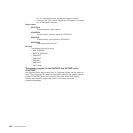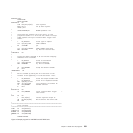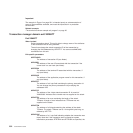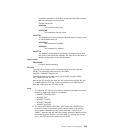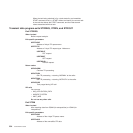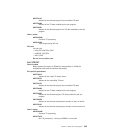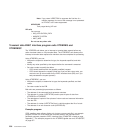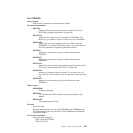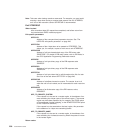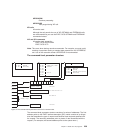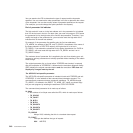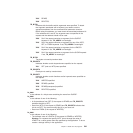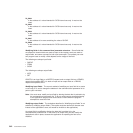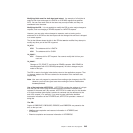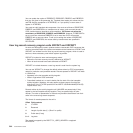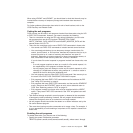Note: Take care when issuing recursive commands. For example, you must avoid
entering a loop when issuing a transient data request from the XTDEREQ
exit. Use of the recursion counter UEPRECUR is recommended.
Exit XTDEREQC
When invoked
After a transient data API request has completed, and before return from
the transient data EXEC interface program.
Exit-specific parameters
UEPCLPS
Address of the command-level parameter structure. See “The
UEPCLPS exit-specific parameter” on page 240.
UEPTDTOK
Address of the 4 byte token to be passed to XTDEREQC. This
allows you, for example, to pass a work area to exit XTDEREQC.
UEPRCODE
Address of a 6-byte hexadecimal copy of the EIB return code
‘EIBRCODE’. For details of EIB return codes, refer to EIB fields, in
the CICS Application Programming Reference manual.
UEPRESP
Address of a 4-byte binary copy of the EIB response code
‘EIBRESP’.
UEPRESP2
Address of a 4-byte binary copy of the EIB response code
‘EIBRESP2’.
UEPTSTOK
Address of a 4-byte token that is valid throughout the life of a task.
See “Use of the task token UEPTSTOK” on page 243.
UEPRECUR
Address of a halfword recursion counter. The counter is set to 0
when the exit is first invoked, and is incremented for each recursive
call.
UEPRSRCE
Address of an 8-character copy of the EIB resource value,
EIBRSRCE.
UEP_TD_REMOTE_SYSTEM
If the request is to be sent to a remote region, is the address of an
area containing the 4-byte name of the remote region. (The remote
region may have been specified by, for example, the SYSID option
of the command, function shipping, or the REMOTESYSTEM option
of the TDQUEUE definition.)
If the request is to be executed on the local region, this parameter
is the address of a 4-byte area containing blanks.
UEP_TD_REMOTE_NAME
If the request is to be sent to a remote region, is the address of an
area containing the 4-character name by which the queue is known
in the remote region.
Return codes
238 Customization Guide



